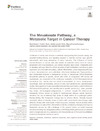Please use this identifier to cite or link to this item:
https://accedacris.ulpgc.es/jspui/handle/10553/105820
| Title: | The Mevalonate Pathway, a Metabolic Target in Cancer Therapy | Authors: | Guerra Hernández, Carlos Borja Recio Cruz, Carlota Pilar Aranda Tavío, Haidee Magdalena Guerra Rodríguez, Miguel Alfonso García Castellano, José Manuel Fernández Pérez, Leandro Fco |
UNESCO Clasification: | 32 Ciencias médicas 320101 Oncología |
Keywords: | Cancer Cholesterol Isoprenoids Mevalonate Oxysterols, et al |
Issue Date: | 2021 | Journal: | Frontiers in Oncology | Abstract: | A hallmark of cancer cells includes a metabolic reprograming that provides energy, the essential building blocks, and signaling required to maintain survival, rapid growth, metastasis, and drug resistance of many cancers. The influence of tumor microenviroment on cancer cells also results an essential driving force for cancer progression and drug resistance. Lipid-related enzymes, lipid-derived metabolites and/or signaling pathways linked to critical regulators of lipid metabolism can influence gene expression and chromatin remodeling, cellular differentiation, stress response pathways, or tumor microenviroment, and, collectively, drive tumor development. Reprograming of lipid metabolism includes a deregulated activity of mevalonate (MVA)/cholesterol biosynthetic pathway in specific cancer cells which, in comparison with normal cell counterparts, are dependent of the continuous availability of MVA/cholesterol-derived metabolites (i.e., sterols and non-sterol intermediates) for tumor development. Accordingly, there are increasing amount of data, from preclinical and epidemiological studies, that support an inverse association between the use of statins, potent inhibitors of MVA biosynthetic pathway, and mortality rate in specific cancers (e.g., colon, prostate, liver, breast, hematological malignances). In contrast, despite the tolerance and therapeutic efficacy shown by statins in cardiovascular disease, cancer treatment demands the use of relatively high doses of single statins for a prolonged period, thereby limiting this therapeutic strategy due to adverse effects. Clinically relevant, synergistic effects of tolerable doses of statins with conventional chemotherapy might enhance efficacy with lower doses of each drug and, probably, reduce adverse effects and resistance. In spite of that, clinical trials to identify combinatory therapies that improve therapeutic window are still a challenge. In the present review, we revisit molecular evidences showing that deregulated activity of MVA biosynthetic pathway has an essential role in oncogenesis and drug resistance, and the potential use of MVA pathway inhibitors to improve therapeutic window in cancer. | URI: | https://accedacris.ulpgc.es/handle/10553/105820 | ISSN: | 2234-943X | DOI: | 10.3389/fonc.2021.626971 | Source: | Frontiers in Oncology [EISSN 2234-943X], v. 11, (Febrero 2021) |
| Appears in Collections: | Artículos |
Show full item record
SCOPUSTM
Citations
94
checked on Jun 8, 2025
WEB OF SCIENCETM
Citations
117
checked on Feb 8, 2026
Page view(s)
93
checked on Jan 10, 2026
Download(s)
80
checked on Jan 10, 2026
Google ScholarTM
Check
Altmetric
Share
Export metadata
Items in accedaCRIS are protected by copyright, with all rights reserved, unless otherwise indicated.
